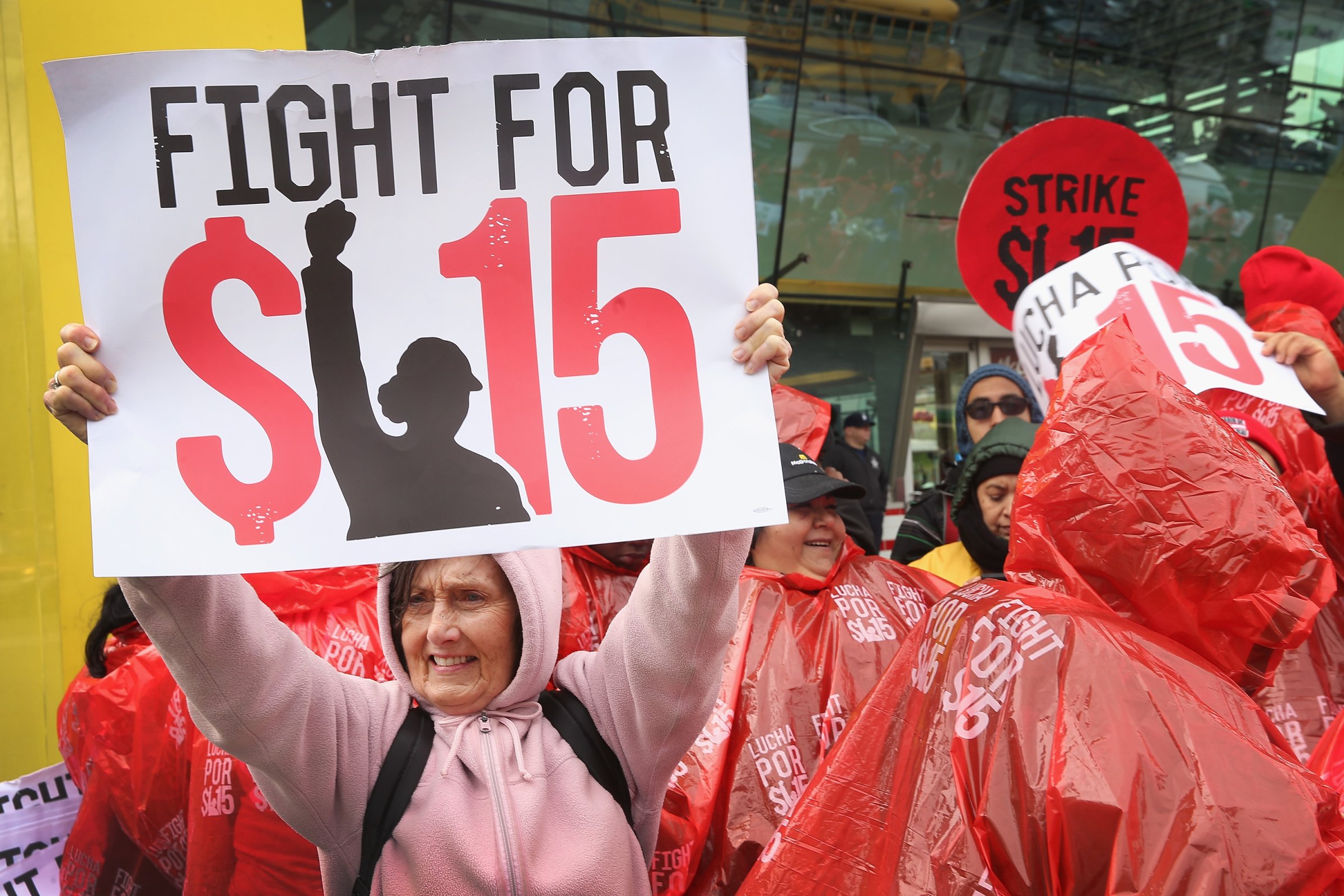
One of the strategies that has made McDonald’s a global fast food power over the decades is the corporation’s rigorous enforcement of standards. McDonald’s dictates everything from signage, to staffing levels, to food quality, to the temperature of the coffee. There’s no way franchisees can have it their way, as one competitor may have put it.
That enforced consistency, so critical to McDonald’s success, has been turned against the company by the National Labor Relations Board, whose general counsel ruled Tuesday that because McDonald’s pulls most of the strings, it has to be considered a co-employer of franchise workers. That decision came despite the company’s stance that franchisees are the employers and thus McDonald’s shouldn’t be held accountable for their actions.
The NLRB’s ruling applies to 181 cases filed since November 2012 by workers who said their rights were violated—e.g., they were fired—for participating in protests over wages. The NLRB tossed 68 of the cases, while 64 others are pending investigation. But the agency found 43 cases to have merit. More than 90% of the McDonald’s 14,000 restaurants are owned by franchisees, according to the company.
The ruling was a victory for organized labor-backed groups, such as Fast Food Forward, as well as other activists who have been running a national campaign to raise fast food wages to $15 an hour. The ruling means that if the NLRB board accepts any of these cases, McDonald’s, and not just its franchisees, will be hauled before an administrative law judge if the cases aren’t resolved through negotiation.
More importantly, the ruling’s broader legal reach has the restaurant and hospitality industries in an uproar — the decision has sent legal experts on the left and right to their perspective corners to gird for a fight that’s expected to eventually reach the Supreme Court.
“This decision to allow unfair labor practice complaints to allege that McDonald’s is a joint employer with its franchisees is wrong,” said Heather Smedstad, senior vice president of human resources at McDonald’s USA, in a statement. “McDonald’s will contest this allegation in the appropriate forum. McDonald’s also believes that this decision changes the rules for thousands of small businesses, and goes against decades of established law regarding the franchise model in the United States.
The ruling is an attempt to resolve a sticky point in labor law about who qualifies as an employer. It’s generally viewed that if a company outsources its work to another firm, that firm becomes the employer, says Richard Hurd, professor of industrial and labor Relations at Cornell University. That can lead to situations where contract employees work side by side with employees of the parent company.
“Unions have been trying to make the case for quite some time that it’s not that straightforward,” Hurd says.
According to Mark Barenberg, professor of labor law at Columbia University, in a quote supplied by Fast Food Forward, the ruling “has the potential to upend the fast-food industry’s decades-long strategy of ‘out-sourcing’ legal responsibility to franchisees when it comes to securing workers’ rights.”
What’s really got the franchising industry worried, though, is that the ruling will open a Pandora’s Box of liability exposure. If brand owners are deemed joint employers in a broader context, it will make them litigation targets for issues such as wages and hours, slips and falls, and sexual harassment, says David Sherwyn, professor of hospitality human resources at the Cornell University School of Hotel Administration. The potential liability is enormous, because litigators always sue the deepest pockets. Franchising companies in the food and hotel industries have spent years figuring out what constitutes control and what doesn’t to give themselves a legal distance from their owners: they can tell franchisees how they must decorate their hotels, for instance, but they won’t dictate employment practices.
“Franchise lawyers have figured out where the line is, and the line is all about control,” says Sherwyn. “Let’s call it the 40 yard line. The lawyers are living on the 38 yard line and I think the [NLRB] general counsel thinks they should be living on the 32.”
The industry wants McDonald’s to hold that line.
Even if the ruling stands up to legal challenges, however, don’t expect it to set off a big organizing campaign by labor unions in the fast food industry, says Hurd.
“This is not a huge step; it doesn’t say the unions can run an organizing campaign against McDonald’s nationally,” Hurd says. “The logistics would be impossible.”
That’s because labor would still have to organize store by store or franchise across a big enough swath of units. But it could allow a union such as the Service Employees International Union (SEIU) the leverage to discuss broad terms of, say, wage and hours policy that a franchisor, whether it’s McDonald’s or La Quinta Inns, could impose on its franchisees. And barring that, it provides the SEIU, which backs Fast Food Forward, its own forward momentum to continue to press for wage increases knowing that the giant McDonald’s Corp., and not just its diverse franchisees, now has a dog in this hunt.
More Must-Reads from TIME
- Donald Trump Is TIME's 2024 Person of the Year
- Why We Chose Trump as Person of the Year
- Is Intermittent Fasting Good or Bad for You?
- The 100 Must-Read Books of 2024
- The 20 Best Christmas TV Episodes
- Column: If Optimism Feels Ridiculous Now, Try Hope
- The Future of Climate Action Is Trade Policy
- Merle Bombardieri Is Helping People Make the Baby Decision
Contact us at letters@time.com